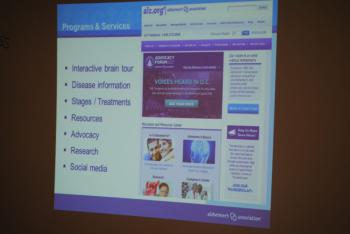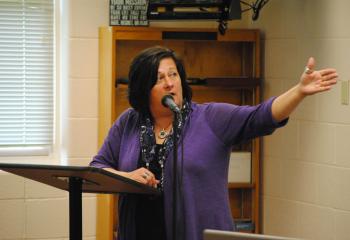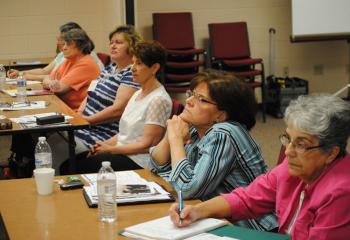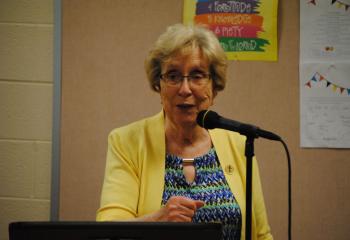By TARA CONNOLLY Staff writer
“Memory loss can bring about loneliness, isolation, sadness and living in the past. It is so important to recognize early warning signs so we can help our loved ones better,” said Kellie Butsack, associate director of programs at Alzheimer’s Association, Delaware Valley Chapter, Reading, during the conference “Understanding Dementia.”
Butsack was the main presenter April 9 at the conference for an estimated 15 parish advocates at St. Mary, Kutztown.
In her presentation, she outlined warning signs, facts, programs and services available through the Alzheimer’s Association Delaware Valley Chapter – the local chapter of the National Alzheimer’s Disease and Related Disorders Association – and other local organizations.
In addition, Butsack told the advocates that the association operates 24 hours a day, seven days a week, in more than 200 languages by highly trained staff.
“Our association can help you with caregiving tips, respite care options, services available in your community and referrals. We are also here for emotional support – as often as you need. We know that living with Alzheimer’s can be overwhelming at times,” she said.
According to Butsack, dementia is a general term for a decline in mental ability severe enough to interfere with daily life. It is caused by damage to brain cells that interrupts normal communication between the cells and affects thinking, behavior and feelings.
“Dementia is not a specific disease. It’s an overall term that describes a wide range of symptoms associated with a decline in memory or other thinking skills severe enough to reduce a person’s ability to perform everyday activities. Alzheimer’s disease accounts for 60 to 80 percent of cases,” said Butsack.
“Vascular dementia, which occurs after a stroke, is the second most common dementia type. But there are many other conditions that can cause symptoms of dementia, including some that are reversible, such as thyroid problems and vitamin deficiencies.
“Memory loss is an example of dementia, with Alzheimer’s being the most common type of dementia.”
She noted that Alzheimer’s is one of the six leading causes of death and that every 66 seconds someone is diagnosed. The average lifespan after diagnosis is eight years and nearly 100 percent of persons with Down syndrome will develop Alzheimer’s if they live long enough.
Although many people have memory loss, Butsack said, the loss does not immediately equate to dementia.
She said symptoms of dementia vary and at least two core mental functions must be significantly impaired to be considered dementia. Some core mental functions include memory, communication and language, ability to focus and pay attention, reasoning and judgment, and visual perception.
“Many dementias are progressive, meaning symptoms start out slowly and gradually get worse. If you or a loved one is experiencing memory difficulties or other changes in thinking skills, don’t ignore them,” she said.
“See a doctor soon to determine the cause. Professional evaluation may detect a treatable condition. And even if symptoms suggest dementia, early diagnosis allows a person to get the maximum benefit from available treatments and provides an opportunity to volunteer for clinical trials or studies. It also provides time to plan for the future.
“Different types of dementia are associated with particular types of brain cell damage in particular regions of the brain. For example, in Alzheimer’s disease, high levels of certain proteins inside and outside brain cells make it hard for brain cells to stay healthy and to communicate with each other.”
To diagnose dementia, Butsack said, there is no single test that can determine dementia. Alzheimer’s and other types of dementia are based on medical history; a physical examination; laboratory tests; and the characteristic changes in thinking, day-to-day function and behavior associated with each type.
She also said treatment is advancing every day, and although there is no cure or treatment to slow down dementia, many drug treatments can temporarily improve symptoms.
Butsack also directed the advocates to the association’s website for more information on caregiver centers; 24/7 hotline; support groups; safety centers; virtual library; and community resource finders.
To learn more about the association, research, services and community resources, visit www.alz.org.











